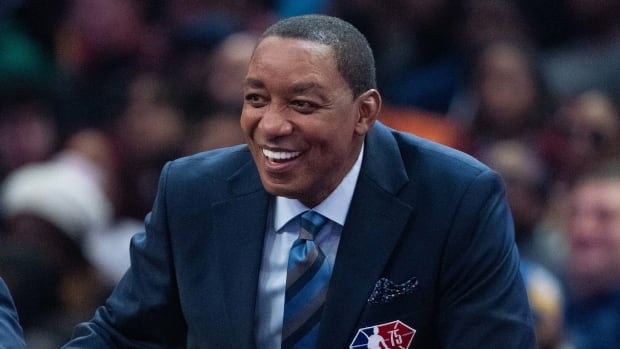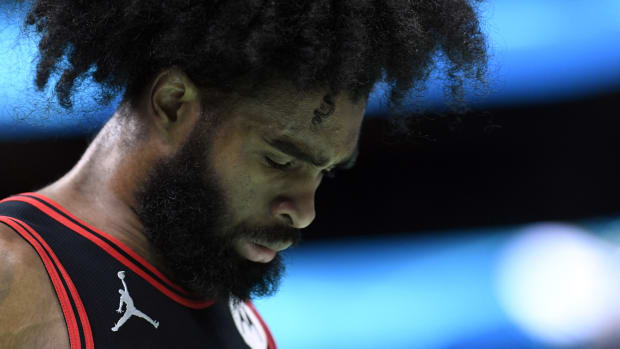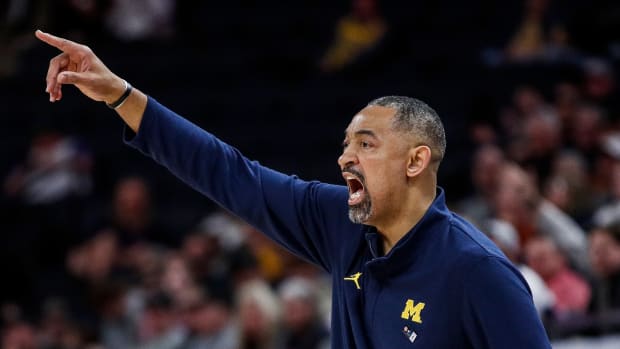En Route to Fifth Straight Finals, Warriors Show They’re the Greatest Comeback Team in NBA History
PORTLAND — In the process of shattering records and winning titles, the Warriors have made the double-digit comeback a matter of procedure. Three times in these Western Conference finals did Golden State trail by 15 points or more before claiming a win. (In the other, fourth game, the Warriors pulled away themselves to win by 22.) This is not normal. Even other great teams haven’t deflated their opponents—and their leads—with such casual regularity. Even other champions have needed the better part of a night to painstakingly build an advantage, much less steal one.
These Warriors are different. ”Well, we know we can cover 17 points in a matter of three, four minutes,” Draymond Green said as a statement of fact. “And so we always try to keep that mindset that we are never out of the game and we just need to make solid plays.” It really is that simple. When Golden State locks in, the game changes. Their defense will stomp out a hot shooter like a bit of kindling. Their speed in transition will break a team’s spirit. It must be so exhausting to know that no matter how much distance a team puts between itself and the Warriors, they are always within range with shooters at the ready.
“It definitely helps,” Green added, “to have No. 30.” The Warriors are a fully actualized team, but what makes them indomitable is the way Stephen Curry brings a game to tilt. It is almost impossible for an opponent to stay at balance when they must also chase Curry to every corner of the floor, shadowing him with extra defenders all the while. Yet guarding Curry is effectively unsustainable. Some of the best defenders in the league will make him work for his points, but in the end he will get his, whether directly or indirectly. In Game 4 against Portland, he got both: 37 points, 13 rebounds, and 11 assists in the punctuating win of a conference finals sweep. It took overtime to put the Trail Blazers away, 119-117, but the game ultimately broke as so many have before. Given a long enough timeline, Curry and Green and Klay Thompson will beat you.
“We’re a superteam for a reason,” Thompson said. “Quote-unquote ‘superteam.’”
Nevermind the fact that Golden State finished this series down three of its best players. Kevin Durant and DeMarcus Cousins were sidelined for the conference finals in their entirety, but Andre Iguodala—whose all-around play catalyzes the Warriors—also missed the final game of the series with soreness in his left calf. In his place, the Warriors started Alfonzo McKinnie, an undrafted role player signed to fill out the roster. He gave the Warriors 12 points. Kevon Looney ground out his way to another 12, and fellow reserves Shaun Livingston and Quinn Cook combined for 12 more. “Strength in Numbers”—the Warriors’ playoff motto for years running—proved more than a hopeful mantra. “It was a good series for the bench,” Warriors coach Steve Kerr said. “They did a fantastic job, and we mixed and matched and tried to find combinations that worked.”
So many of those combinations involved Curry, whose shooting alone buoyed lineups that would otherwise have been dead in the water. It’s not that Curry makes a specialist into a threat in the way that Steve Nash might. Rather than pass a teammate open, Curry cuts them loose—moving in a way that demands a defensive response, and then trusting in a playmaker like Green to decide what comes next. No matter how you choose to play them, the Warriors always seem to be at a numbers advantage on the weak side of the floor, rolling downhill on possessions that shouldn’t have access to that kind of momentum. It’s Curry who makes it all possible, and Green who puts everything into practice.
Every team needs a player like Green. The problem is there is really only one of him in the world: a completely apositional defender (Green actually defended CJ McCollum on the final possession of overtime), a first-rate playmaker, a top-notch competitor, and an offensive accelerant rolled into one convenient form. “Steph and Klay, they’re shooting the ball all over the place,” Damian Lillard said. “But I mean, Draymond Green, he’s nonstop talking on the court. He’s rebounding the ball. He’s basically the point guard of the team. He’s pushing the ball. He’s making plays. He’s calling out our plays. I mean, he’s controlling everything for them. I think because he’s always so vocal, always on top of everybody, always kind of managing everything for them, it keeps them consistent. They’re steady.”
Curry overwhelms. Thompson punishes. Green simply creates traction, the very thing that makes it possible to climb out of a hole in the first place. As noted on SportsCenter, the Trail Blazers actually led in these Western Conference finals for 101 total minutes to the Warriors’ 83. Golden State never flinched. If their defense faltered (as it did through much of Game 4), they made corrections, bided their time, and came through in the end. When Portland made runs, Curry struck back—like with the eight unanswered points he scored in the final 30 seconds of the first half. Their series was a deconstruction of the championship psyche, and within it, the power to quiet all doubt.


































